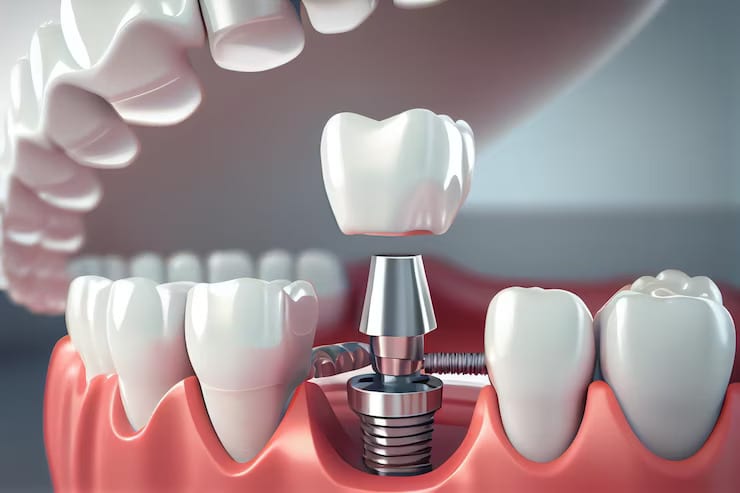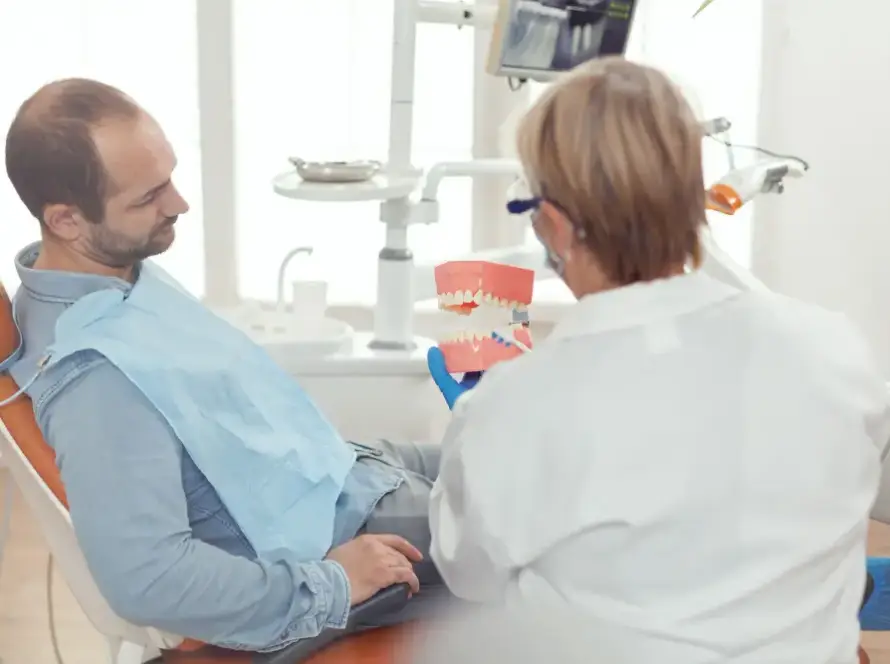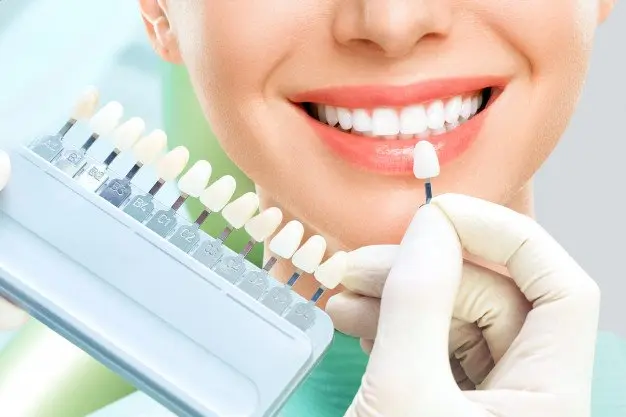Teeth whitening, a popular cosmetic dental procedure, aims to lighten the color of teeth and remove stains and discoloration. This procedure has gained significant attention due to its ability to enhance the appearance of one’s smile, which in turn can impact psychological well being.
Teeth can become discolored for various reasons, including:
- Dietary Habits: Consumption of coffee, tea, red wine, and certain fruits can lead to staining.
- Tobacco Use: Smoking or chewing tobacco introduces substances that cause yellowing.
- Medication: Some medications, like tetracycline, can lead to intrinsic stains.
- Ageing: Over time, the enamel on teeth wears down, revealing the yellower dentin beneath.
- Genetics: Certain individuals may naturally have a darker tooth color.
There are several methods for teeth whitening, each varying in effectiveness, duration, and cost:
- In Office Whitening:
- Administered by a dental professional.
- Utilizes powerful bleaching agents and can include technologies like laser or light.
- Typically results in significant whitening in a short period.
- At Home Whitening Kits:
- Provided or recommended by dentists.
- Includes custom fit trays and professional grade whitening gel.
- Usually takes days to weeks to achieve desired results.
- Over The Counter Products:
- Includes whitening strips, gels, toothpaste, and rinses.
- Generally less potent than professional treatments.
- Provides gradual results and is more cost effective.
The safety and efficacy of teeth whitening depend on the method used and the individual’s dental health. Professional consultation is advised to minimize risks such as increased tooth sensitivity and gum irritation. Effective whitening relies on proper assessment and tailored treatments administered by licensed professionals. An understanding of these processes is crucial to appreciating the psychological impacts linked to enhanced smile aesthetics.
The Psychological Impact of Teeth Whitening
Appearance holds a significant role in human psychology. Research demonstrates that individuals form first impressions within seven seconds of meeting someone. Physical appearance, therefore, profoundly influences initial judgments and social interactions. Teeth, being a prominent feature of facial aesthetics, contribute significantly to one’s overall appearance.
The psychology of appearance can be examined through several key factors:
- Self Perception: People often judge themselves based on their physical characteristics. White, well maintained teeth can enhance self esteem and self worth. Conversely, stained or discolored teeth may lead to feelings of self consciousness and insecurity.
- Social Perception: Society places substantial emphasis on aesthetics. Individuals with whiter teeth are often perceived as more attractive, successful, and trustworthy. This perception influences social dynamics, impacting both personal and professional relationships.
- Attractiveness Standards: Cultural and societal norms define concepts of beauty. These standards evolve, but the desire for an attractive smile often remains constant. Teeth whitening aligns individuals with these societal ideals, potentially enhancing their social standing and confidence.
- Psychosocial Impact: The state of one’s teeth can affect mental health. Positive perceptions of one’s appearance are linked to higher psychological well being. In contrast, dissatisfaction can lead to anxiety, depression, and social withdrawal. Whitening teeth, therefore, may alleviate some of these psychological burdens.
- Behavioral Changes: Improved self esteem from whitening can result in positive behavioral shifts. Individuals may become more outgoing, smile more frequently, and engage more confidently in social interactions.
Understanding these psychological aspects underscores the importance of dental aesthetics. The transformative power of teeth whitening extends beyond superficial changes, deeply impacting psychological well being and social perception.
Self Perception and Confidence: Before and After
The transformation in self perception and confidence post teeth whitening is profound and multifaceted. Individuals often begin their teeth whitening journey with various preconceived beliefs about their appearance and social standing.
Before Teeth Whitening
- Reduced Self Esteem: Many individuals report feeling insecure due to stained or discolored teeth. This can significantly affect how they perceive their attractiveness.
- Social Anxiety: Fear of judgment or negative reactions may lead to anxiety in social situations. These feelings often stem from concerns about smiling or speaking.
- Professional Concerns: In professional settings, individuals may feel that their dental appearance hinders their career progression or acceptance in professional circles.
- Emotional Impact: Constant self-awareness about one’s teeth can lead to stress, affecting mental well being. This emotional strain may exacerbate feelings of inadequacy.
After Teeth Whitening
- Enhanced Self esteem: Post treatment, individuals often report a marked improvement in how they view themselves. The whiter, brighter smile directly correlates with heightened confidence levels.
- Increased Social Interactions: Improved self perception encourages more social engagement, as individuals feel less inhibited about their appearance.
- Professional Benefits: A whiter smile can positively influence one’s professional image, leading to better rapport with colleagues and superiors. This perceived improvement in personal grooming can enhance career opportunities.
- Positive Emotional Shift: Emotional well-being improves significantly. Individuals experience reduced stress and anxiety, replaced by a sense of pride and contentment.
Comparative Analysis
- Self-Worth Dynamics: Before treatment, self worth can be intertwined with dental aesthetics, leading to a lower self-image. Teeth whitening can disrupt this negative cycle, fostering a healthier self regard.
- Behavioral Changes: Initial reluctance to engage in open social or professional settings often shifts post-whitening. Individuals display more openness and willingness to participate.
- Perceptual Shifts: The psychological metamorphosis post treatment underscores the importance of personal appearance in shaping one’s perceptions and interactions. The newfound confidence often extends beyond smile aesthetics, influencing overall demeanor and approach to life.
The Role of Media and Celebrity Influence
Media and celebrity influence greatly shape an individual’s perception of an ideal smile. Celebrities frequently showcase their gleaming veneers and perfect dental work, often setting unattainable standards.
- Television and Film: Popular television shows and films often cast actors with impeccably white teeth, creating a normative beauty standard. Characters rarely seen with imperfect smiles contribute to the societal expectation that white teeth are essential.
- Social Media: Platforms such as Instagram and TikTok emphasize aesthetics, with a high focus on facial features. Influencers and public figures often promote teeth-whitening products, presenting them as indispensable to achieving beauty. Posts and videos often show before-and-after transformations, reinforcing the notion that whiter teeth are better.
- Advertising Campaigns: Marketing campaigns for dental products use glamorous imagery and testimonials from high profile personalities. These advertisements emphasize the importance of a bright smile in social success and self esteem, further internalizing the importance of teeth whitening.
- Celebrity Endorsements: High profile celebrities endorsing specific teeth whitening brands influence consumer behavior significantly. Their endorsements suggest that adopting their routines will result in similar desirability and success.
The combined pressure from various media sources often leads individuals to believe that their self-worth is correlated with their appearance, including their smile quality. This can compel individuals to invest in teeth whitening procedures, sometimes without considering potential psychological ramifications.
Furthermore, media portrayal of cosmetic dentistry as a routine activity minimizes the perceived risk and encourages frequent treatments. Normalizing these procedures creates unrealistic expectations and can lead to dissatisfaction if results do not meet the high set standards. In extreme cases, the pursuit of the perfect smile can contribute to body dysmorphic disorders, where individuals become obsessed with perceived flaws in their appearance.
Understanding these influences is crucial for dental professionals and psychologists aiming to provide holistic care, ensuring that patients seek treatments for healthy reasons rather than external pressures.
Social Interactions and First Impressions
Teeth whitening plays a significant role in social interactions and the formation of first impressions. Individuals often judge others based on their physical appearance within seconds of an initial meeting. A bright, white smile can greatly influence how a person is perceived in various social contexts.
Perception of Attractiveness
- Positive Attribute Enhancement: White teeth are often associated with good health, youth, and hygiene. These associations can enhance the overall attractiveness of an individual.
- Symmetry and Aesthetics: A visually appealing smile can contribute to facial symmetry, which is a critical factor in perceptions of attractiveness.
Confidence and Self Esteem
- Increased Social Confidence: Individuals with whitened teeth may feel more confident in social settings, impacting their willingness to engage and present themselves.
- Reduction in Social Anxiety: The improvement in self esteem resulting from teeth whitening can lead to reduced social anxiety, allowing for more comfortable interactions.
Professional Interactions
- First Impressions in the Workplace: In professional environments, a white smile can lead to favorable first impressions, potentially impacting hiring decisions and workplace relationships.
- Negotiation and Persuasion: A bright smile can enhance persuasive abilities. This is pivotal in roles requiring frequent negotiations or client interactions.
Psychological Effects
Teeth whitening can induce a psychological placebo effect, where the individual feels more competent and confident as a result of their improved smile, even if the actual change in appearance is minimal.
“The influence of a white smile extends beyond superficial appeal; it can alter people’s perceptions and interactions on profound psychological levels.”
Social Credibility
- Trustworthiness: A white smile can make an individual appear more trustworthy, which is essential in both personal and professional relationships.
- Social Status and Appeal: There is a perceived correlation between white teeth and higher social status, which can impact how individuals are treated in social groups.
Challenges and Misconceptions
- Unrealistic Expectations: Overemphasis on achieving perfect white teeth can lead to unrealistic expectations and dissatisfaction.
- Diverse Definitions of Normal: The perception of what constitutes an acceptable smile varies culturally, and a standardized view may not always be beneficial.
Teeth whitening’s impact on social interactions and first impressions is profound, shaping individual experiences and self-perception across various contexts.
The Impact on Personal Relationships
Teeth whitening can significantly affect personal relationships by influencing how individuals perceive themselves and how they are perceived by others. Enhanced self-esteem stemming from whiter teeth can lead to more confident social interactions.
- Increased Social Engagement: Individuals with whiter teeth may feel more comfortable engaging in social situations. This increased comfort can result in stronger bonds and more fulfilling relationships.
- Improved Communication: Whiter teeth can remove self consciousness about one’s smile, leading to more open and effective communication. People are more likely to smile and interact positively when they are not worried about their teeth.
- Perception of Attractiveness: Partners and peers may view individuals with whiter teeth as more attractive. This perceived attractiveness can bolster romantic relationships and friendships by reinforcing positive feelings and reducing social barriers.
- Psychological Effects on Partners: The increased confidence and positivity in one partner can positively influence the relationship’s dynamic. Partners may find themselves more drawn to individuals who exude confidence and happiness.
- Reduced Social Anxiety: For those who previously felt self conscious about their teeth, whiter teeth can significantly reduce social anxiety. Lower anxiety levels can lead to more spontaneous, genuine interactions and stronger connections.
Whiter teeth thus have a multifaceted impact on personal relationships, influencing not just the individual undergoing the procedure but also those around them.
Teeth Whitening and Workplace Dynamics
Enhancing one’s appearance through teeth whitening has shown significant effects in professional environments, influencing both self perception and how colleagues perceive an individual. Being part of a physically attractive group can confer advantages such as higher likeability and credibility.
Self Perception in Professional Settings:
- Employees who undergo teeth whitening treatments often report increased self esteem.
- This boost in self image can translate into higher levels of confidence during presentations and meetings.
- Enhanced self perception can lead to improved job performance and a greater willingness to take on additional responsibilities or leadership roles.
Perception by Colleagues:
- Visibly whiter teeth can make an individual appear more competent and trustworthy in the eyes of their coworkers.
- Attractive individuals may benefit from the “halo effect,” where a pleasant physical appearance positively influences others’ opinions about their other characteristics.
- First impressions are crucial in workplace dynamics, and teeth whitening can contribute to forming a favorable initial perception.
Impact on Professional Relationships:
- Positive changes in appearance can improve interactions with colleagues, leading to more effective team collaboration.
- Employees with a brighter smile may find it easier to build rapport with both peers and supervisors, fostering a more cohesive work environment.
- Enhanced appearance through teeth whitening can indirectly affect how one’s ideas and suggestions are received, potentially increasing the influence one has within the team or organization.
Workplace Opportunities:
- Advancement Opportunities:
- Increased confidence and improved perception by others can open doors to promotions and career advancement.
- Networking Potential:
- Whiter teeth can make individuals more approachable, aiding in networking efforts both within and outside the company.
- Client Interaction:
- Employees with enhanced smiles may create better impressions on clients, enhancing professional relationships and securing business deals.
In the corporate world, where visual impressions can significantly affect professional dynamics, teeth whitening appears to play a noteworthy role. It not only improves personal self esteem but also has the potential to positively influence the perceptions and interactions within the workplace.
Potential Psychological Risks and Downsides
Teeth whitening, while often viewed positively, can carry potential psychological risks and downsides. These can stem from various factors, including unrealistic expectations, social pressures, and personal dissatisfaction.
Unrealistic Expectations
- People may develop unrealistic expectations of the results, influenced by the flawless smiles seen in media.
- When the outcome does not meet these high expectations, individuals may experience feelings of disappointment and inadequacy.
Social Pressures
- Society often equates white teeth with attractiveness and success, amplifying the pressure to conform.
- This social bias can lead to increased levels of anxiety, especially in social situations or professional environments.
Personal Dissatisfaction
- Personal dissatisfaction may arise from comparing one’s teeth to others’ perceived perfection.
- Individuals who are overly concerned with their appearance might obsess over minor imperfections, leading to body dysmorphic disorders.
Financial Stress
- Professional teeth whitening procedures can be costly, adding financial strain.
- Spending substantial amounts on repeated whitening treatments may create financial stress, further impacting mental well being.
Addiction to Whitening
- A preoccupation with maintaining whitened teeth can lead to “bleachorexia,” a condition where individuals become addicted to teeth whitening.
- This obsession can overshadow other aspects of life, contributing to a decline in overall psychological health.
Negative Self Perception
- When results are not as dramatic or long lasting as expected, individuals may develop a negative self perception.
- The fixation on achieving perfect whiteness can lead to detrimental effects on self esteem and a distorted self image.
Impact on Relationships
- The pursuit of an ideal smile may sometimes result in strained personal relationships.
- Constant concern over appearance can prevent meaningful social interactions, leading to feelings of isolation or being misunderstood.
Psychological Dependency
- There is the potential for psychological dependency on the approval and praise received after whitening.
- Dependency on external validation can impede the development of a healthy, intrinsic self worth.
Risk of Over Whitening
- Repeated whitening procedures can cause tooth sensitivity or gum irritation, which may in turn cause psychological distress.
- Physical discomfort can amplify anxiety and create a negative cycle affecting overall mental health.
In summary, while teeth whitening can enhance one’s appearance and confidence, it is crucial to consider the potential psychological risks and manage expectations accordingly. Balancing desire for aesthetic improvement with realistic outcomes is essential for maintaining mental well being.
Expert Opinions from Dentists and Psychologists
Dentists’ Insights
Surface Level Benefits Dentists emphasize the noticeable effect teeth whitening has on smile aesthetics. Dr. Emily Smith, DDS, states, “Patients often leave with a brighter, more confident smile, leading to an immediate boost in self esteem.” Whitening procedures can correct discoloration caused by diet, smoking, and natural aging.
Health and Safety Considerations Professional whitening is deemed safe when performed correctly. Dr. John Wilson, a renowned cosmetic dentist, highlights, “While over the counter products can work, they often lack the customization professional treatments provide, minimizing risks of sensitivity or gum irritation.” Dentists also note that improper use of at home kits can lead to enamel erosion and other dental issues.
Psychologists’ Perspectives
Impact on Self Esteem Psychologists underline the profound connection between a person’s smile and their self image. Dr. Linda Harper, a licensed psychologist, explains, “A whiter smile can significantly enhance a person’s self confidence and social interactions.” This psychological uplift can lead to improved personal and professional relationships.
Behavioral Changes Whitening teeth can also spur positive behavioral changes. According to Dr. Robert Green, a clinical psychologist, “Patients often engage in more rigorous dental hygiene practices post treatment. The psychological benefits of a brighter smile encourage them to maintain their dental health.” This behavioral shift can lead to long term oral health improvement.
Social Perception The societal perception of a whiter smile can’t be ignored. Dr. Janet Lee, a social psychologist, observes, “In social contexts, individuals with whiter teeth are often perceived as more attractive, trustworthy, and successful.” This shift in how others view them can reinforce the individual’s self esteem and confidence.
Dentists and psychologists collectively acknowledge that while the primary motive for teeth whitening may be cosmetic, the psychological benefits carry substantial weight. The combined expertise of both fields highlights the multifaceted impact of brighter teeth on an individual’s overall well being.
Weighing the Psychological Benefits and Risks
Society places considerable emphasis on physical appearance, and dental aesthetics play a pivotal role in how individuals perceive themselves and others. Teeth whitening, as a cosmetic procedure, holds potential psychological benefits but also carries inherent risks.
Psychological Benefits:
- Enhanced Self-Esteem: Research indicates that whiter teeth can improve self-esteem. People often report feeling more confident in social interactions and professional settings.
- Improved Self-Image: Those who undergo teeth whitening tend to have a better self-image, feeling more attractive and content with their physical appearance.
- Reduction of Social Anxiety: With enhanced confidence, individuals may experience a decrease in social anxiety, leading to improved personal and professional relationships.
- Positive First Impressions: Whiter teeth contribute to making positive first impressions, which can be crucial in networking, dating, and job interviews.
Psychological Risks:
- Unrealistic Expectations: Media portrayal and societal standards may create unrealistic expectations of the results, leading individuals to feel disappointed even after successful treatments.
- Obsessive Behavior: There’s a risk of developing an obsession with dental aesthetics, potentially leading to excessive treatments and an unhealthy focus on appearance.
- Emotional Distress: If the procedure results in pain, sensitivity, or other complications, individuals might experience emotional distress and frustration.
- Temporary Confidence Boost: The improved self-esteem might be temporary, especially if the individual does not address underlying self-worth issues beyond physical appearance.
Professional Recommendations:
Dentists and psychologists recommend a balanced approach to teeth whitening:
- Consultation: A thorough consultation with a dental professional is crucial to set realistic expectations.
- Comprehensive Care: Mental health professionals should be involved when necessary, especially if there are signs of obsession or emotional distress.
- Education: Educating patients on the risks alongside benefits ensures informed decisions.
- Follow-Up: Regular follow-up appointments can help manage side effects and address any psychological concerns timely.
In balancing benefits and risks, an integrated approach combining dental expertise with psychological support can optimize the overall outcome for individuals seeking teeth whitening treatments.
Future Trends in Cosmetic Dentistry and Mental Health
The intersection of cosmetic dentistry and mental health is rapidly evolving, influenced by advances in technology, changes in societal norms, and a deeper understanding of psychological well-being. Several key trends are emerging:
Technological Innovations
- 3D Printing: The adoption of 3D printing technology is revolutionizing cosmetic dentistry. It allows for rapid prototyping and personalized dental solutions, reducing treatment times and improving accuracy.
- Virtual Reality (VR): VR and augmented reality (AR) technologies are being integrated into dental practices to enhance patient experiences. These technologies can reduce anxiety through immersive environments and provide comprehensive virtual consultations.
- AI and Machine Learning: Artificial intelligence is being utilized for improved diagnostics and treatment planning, with machine learning algorithms predicting outcomes and personalizing treatments based on individual psychological profiles.
Holistic Approaches
- Interdisciplinary Collaboration: There is a growing trend towards incorporating psychological consultations into dental practices. Dentists and mental health professionals are collaborating to address the emotional and psychological impacts of dental treatments.
- Mindfulness and Stress Reduction: Techniques such as mindfulness and relaxation exercises are being incorporated to alleviate patient anxiety, promoting a positive mindset before and after cosmetic procedures.
Consumer Trends
- Natural and Sustainable Options: Patients are increasingly seeking treatments that are both environmentally sustainable and favoring natural-looking results. This shift is driven by a broader societal trend towards wellness and sustainability.
- At-Home Whitening Kits: The market for at-home teeth whitening products continues to grow, driven by advancements that offer professional-level results with greater convenience and affordability.
Psychological Assessments
- Pre-treatment Screening: More practices are incorporating psychological assessments to better understand the mental health status of patients before undergoing cosmetic procedures. This ensures that the expectations align with realistic outcomes.
- Post-treatment Support: Follow-up support emphasizing mental wellness is becoming standard. This includes counseling to manage any post-procedure dissatisfaction or undue psychological stress.
Educational Efforts
- Training Programs: Dental education programs are starting to include mental health modules to equip future dentists with basic psychological skills. This enhances their ability to manage the emotional aspects of cosmetic treatments.
- Patient Education: Informing patients about the psychological benefits and potential risks of cosmetic dentistry, ensuring informed decision-making and realistic expectations.
These trends collectively signify a transformative shift in how cosmetic dentistry practices address not only the physical but also the mental well-being of patients.














